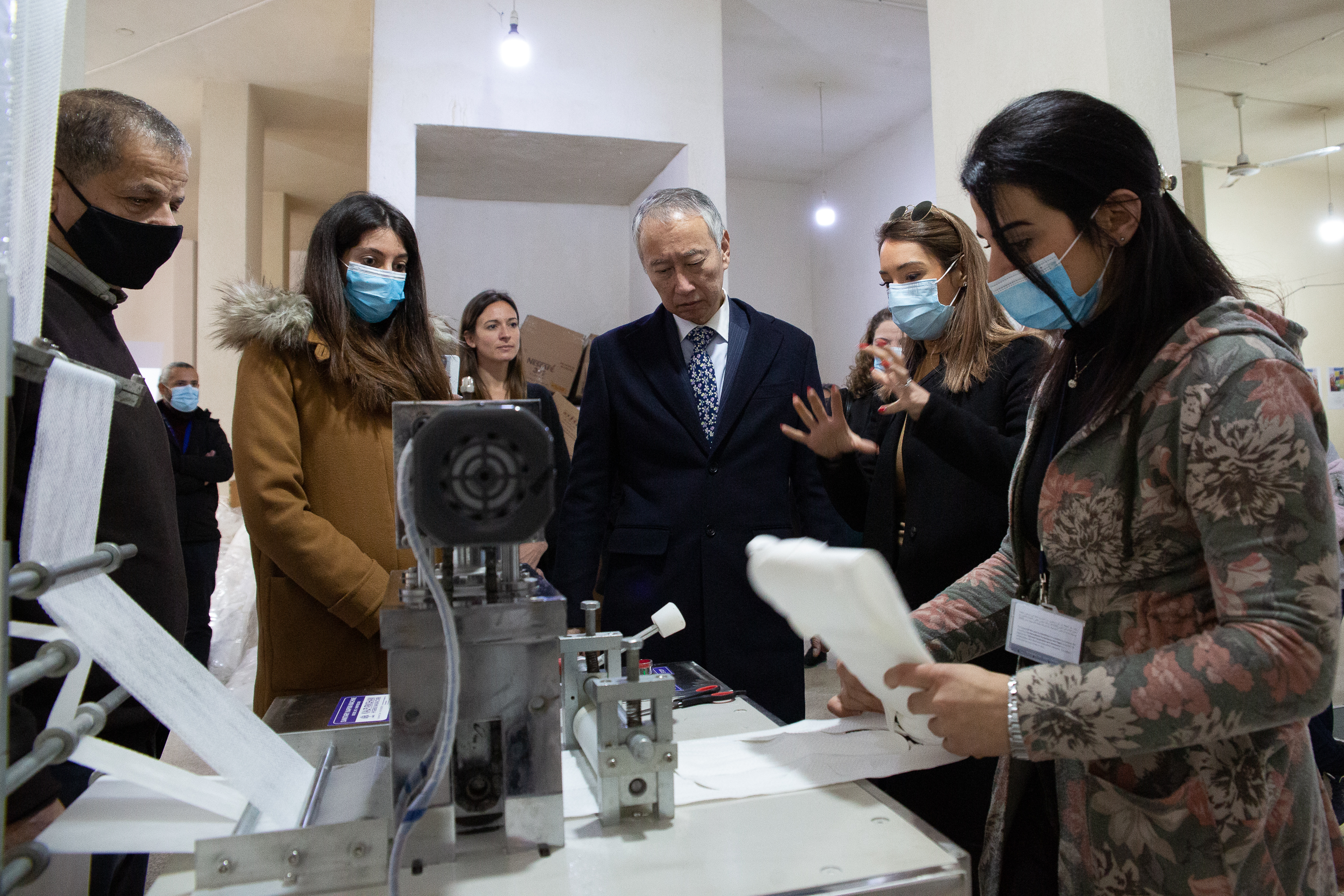A Tripoli-based social enterprise begins the production of high quality, low-cost feminine hygiene products, meeting humanitarian needs and addressing period poverty, with support from the government of Japan
Date:

Beirut, 23 March 2022 — Today the Ambassador of Japan to Lebanon, H.E. OKUBO Takeshi, toured a new production unit established by the social enterprise Roof and Roots, in Jabal Mohsen, Tripoli, supported by the Government of Japan through UN Women and ACTED. The new unit is producing a line of high quality affordable sanitary products, produced by women, for women, to respond to increased humanitarian needs in Lebanon, including period poverty, as well as women’s marginalization from the economy.
“Khalil Gebran once said that nations and civilizations are only built on women's shoulders. I find it fundamentally important to expedite the national recovery process by empowering women in Lebanon’s economy. I strongly hope that this Japan-funded project will help stimulate the local economy of Tripoli through job creation for women. Stability of Tripoli is a prerequisite for a long-lasting stability of Lebanon”, remarked His Excellency OKUBO Takeshi, Ambassador of Japan to Lebanon during the tour.
Lebanon’s economic, political and social crisis has resulted in an estimate of 74% of the population living below the poverty line as of March 2021. Resulting from decades of structural gender discrimination, women have been amongst the hardest hit by the crisis, experiencing disproportionately high levels of food insecurity.
With increased inflation, the continued devaluation of the currency and increased consumer price, the price of basic necessary sanitary products, whether manufactured locally or imported, have increased dramatically. The cost of sanitary products (for imported and locally produced ones) has been increasing at an alarming rate, with an overall increase of around 320% since October 2019.1 It is estimated that this has left 66% of women without the financial means to buy menstrual hygiene supplies,2 women and girls, without access to sanitary products, resulting in 700,0003 at least suffering from period poverty To respond to this, and to women’s underrepresentation in the economy, UN Women, with generous support from the Government of Japan, partnered with ACTED to support the establishment of a production unit within a social enterprise producing menstrual hygiene products in Jabal Mohsen. The outcome is the product, Rose, a high-quality disposable hygienic sanitary pad to be sold at affordable rates across Tripoli, with a percentage donated to benefit low-income families.
The new production unit, launched in February 2022, aims to create a sustainable and marketable product line, while safeguarding women's dignity and rights. It is envisaged that an initial batch of 13,500 packs of pads (10 pads per package) will be produced by the end of March 2022. They will be sold in small businesses and door-to-door, with a percentage distributed to vulnerable women residing in the area. Through this work, 120 women have been provided with vocational training and short-term employment opportunities.
“Lebanon cannot recover without a healthy, productive domestic sector. It is a country with the human capital and resources to produce much of what it imports”, noted Ms. Rachel Dore-Weeks, Head of UN Women in Lebanon, “As UN Women we are excited to be able to demonstrate what is possible when we invest in the ideas and capacities of women; to support them to meet the unprecedented needs the country faces today, and to begin to find pathways away from a dependency on aid.”
The Unit is currently in process of obtaining its industrial certification and will continue to operate and generate income and job opportunities for vulnerable women in the area while supplying the market with affordable high-quality disposable hygiene pads. “Rose” is in process of being approved by Libnor as safe for use, and its packaging is produced using recycled materials.
Media Contact:
Roula Rached, UN Women: roula.rached@unwomen.org
1. UN calculations based on the average increase in the price of a 10 pack of pads from October 2019 to May 2021
2. COVID-19: Girls in Lebanon Left Struggling for Food, Sanitary Pads. Plan International, April 2020. https://plan-international.org/news/2020-04-28-covid-19-girls-lebanon-left-struggling
3. Based on a poverty rate of 50% and 1.4 million Lebanese women using sanitary pads